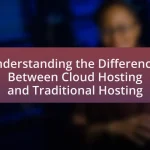VPS hosting, or Virtual Private Server hosting, is a crucial web hosting solution for e-commerce businesses, offering dedicated resources that enhance performance, security, and scalability. This article explores the significance of VPS hosting in e-commerce, detailing how it differs from other hosting types, its key features, and the benefits it provides for website performance and customer experience. Additionally, it addresses the challenges associated with VPS hosting, including security risks and management complexities, while outlining best practices for optimizing performance and maintaining security. The comprehensive analysis underscores the vital role of VPS hosting in achieving e-commerce success.
What is VPS Hosting and its Importance in E-commerce?
VPS hosting, or Virtual Private Server hosting, is a type of web hosting that provides dedicated resources on a virtual server, allowing businesses to have more control and flexibility compared to shared hosting. Its importance in e-commerce lies in its ability to offer enhanced performance, security, and scalability, which are critical for online stores that experience varying traffic levels and require reliable uptime. For instance, VPS hosting can handle high traffic volumes during peak shopping seasons without compromising site speed, which is essential for maintaining customer satisfaction and conversion rates. Additionally, VPS hosting allows e-commerce businesses to implement advanced security measures, such as firewalls and dedicated IP addresses, protecting sensitive customer data and building trust.
How does VPS Hosting differ from other hosting types?
VPS hosting differs from other hosting types by providing dedicated resources within a shared environment, allowing for greater control and customization. Unlike shared hosting, where multiple users share the same server resources, VPS hosting allocates a specific portion of the server’s resources to each user, ensuring better performance and stability. Additionally, compared to dedicated hosting, which offers an entire server for a single user, VPS hosting is more cost-effective while still delivering enhanced performance and flexibility. This combination of dedicated resources and affordability makes VPS hosting particularly suitable for e-commerce businesses that require reliable uptime and the ability to scale as their needs grow.
What are the key features of VPS Hosting?
VPS hosting offers several key features that enhance performance and flexibility for users. Firstly, it provides dedicated resources, meaning that each virtual server has its own allocated CPU, RAM, and storage, which leads to improved performance compared to shared hosting. Secondly, VPS hosting allows for root access, enabling users to install and configure software as needed, which is essential for custom applications. Additionally, it offers scalability, allowing businesses to easily upgrade resources as their needs grow without significant downtime. Security is another critical feature, as VPS hosting typically includes enhanced security measures, such as firewalls and isolated environments, protecting against potential threats. Finally, VPS hosting often includes better uptime guarantees, ensuring that e-commerce sites remain accessible to customers. These features collectively contribute to the reliability and efficiency required for successful e-commerce operations.
Why is VPS Hosting preferred for e-commerce websites?
VPS hosting is preferred for e-commerce websites due to its combination of dedicated resources, enhanced security, and scalability. E-commerce platforms require reliable performance and fast loading times to ensure a positive user experience, which VPS hosting provides by allocating specific resources to each user, unlike shared hosting. Additionally, VPS hosting offers better security features, such as isolated environments and customizable firewalls, which are crucial for protecting sensitive customer data and transactions. Furthermore, VPS hosting allows for easy scalability, enabling e-commerce businesses to adjust their resources based on traffic fluctuations, especially during peak shopping seasons. This adaptability is essential for maintaining operational efficiency and customer satisfaction.
What role does VPS Hosting play in website performance?
VPS hosting significantly enhances website performance by providing dedicated resources that improve speed and reliability. Unlike shared hosting, where multiple websites compete for the same server resources, VPS hosting allocates specific amounts of CPU, RAM, and bandwidth to each user, resulting in faster load times and better overall performance. Studies show that websites with faster loading speeds can see conversion rates increase by up to 7% for every second of improvement, highlighting the direct impact of VPS hosting on e-commerce success.
How does VPS Hosting impact website loading speed?
VPS hosting significantly enhances website loading speed by providing dedicated resources that are not shared with other users. This isolation allows for faster data processing and reduced latency, as the server can allocate CPU, RAM, and bandwidth specifically for a single website’s needs. Studies show that websites hosted on VPS can load up to 30% faster compared to shared hosting environments, where resources are often stretched thin due to multiple sites competing for the same server capabilities. This improved speed is crucial for e-commerce success, as faster loading times correlate with higher conversion rates and better user experience.
What are the implications of downtime for e-commerce businesses?
Downtime for e-commerce businesses leads to significant financial losses and damage to brand reputation. Research indicates that even a single hour of downtime can cost businesses thousands of dollars in lost sales; for instance, a study by Gartner estimates that the average cost of IT downtime is $5,600 per minute. Additionally, prolonged outages can result in customer dissatisfaction and loss of trust, which can have long-term effects on customer retention and loyalty. Therefore, minimizing downtime is crucial for maintaining operational efficiency and ensuring a positive customer experience in the competitive e-commerce landscape.
How does VPS Hosting enhance security for e-commerce platforms?
VPS hosting enhances security for e-commerce platforms by providing dedicated resources and isolated environments that reduce vulnerabilities. Unlike shared hosting, where multiple websites share the same server, VPS hosting allocates specific server resources to each user, minimizing the risk of cross-site attacks. Additionally, VPS hosting often includes advanced security features such as firewalls, DDoS protection, and regular security updates, which are crucial for safeguarding sensitive customer data and payment information. According to a study by the Ponemon Institute, 60% of small businesses that experience a data breach go out of business within six months, highlighting the importance of robust security measures like those offered by VPS hosting.
What security features are typically included in VPS Hosting?
VPS hosting typically includes security features such as firewalls, DDoS protection, and regular backups. Firewalls help to monitor and control incoming and outgoing network traffic based on predetermined security rules, thereby preventing unauthorized access. DDoS protection safeguards against distributed denial-of-service attacks, which can overwhelm a server with traffic, ensuring uptime and availability. Regular backups are crucial for data recovery, allowing businesses to restore their systems in case of data loss or breaches. These features collectively enhance the security posture of VPS hosting, making it a reliable choice for e-commerce operations.
How does VPS Hosting protect sensitive customer data?
VPS Hosting protects sensitive customer data through isolation, enhanced security measures, and customizable configurations. Each virtual private server operates independently, ensuring that data from one user is not accessible to others, which significantly reduces the risk of data breaches. Additionally, VPS Hosting often includes advanced security features such as firewalls, DDoS protection, and regular software updates, which further safeguard sensitive information. For instance, a study by the Ponemon Institute found that organizations using virtualized environments experienced 30% fewer data breaches compared to those using shared hosting solutions, highlighting the effectiveness of VPS in protecting customer data.
What are the benefits of using VPS Hosting for E-commerce Success?
VPS hosting provides significant benefits for e-commerce success by offering enhanced performance, scalability, and security. Enhanced performance is achieved through dedicated resources, which ensure faster loading times and improved user experience, crucial for retaining customers. Scalability allows e-commerce businesses to easily adjust their resources based on traffic fluctuations, accommodating growth without downtime. Security is strengthened with VPS hosting, as it offers isolated environments that protect sensitive customer data and transactions, reducing the risk of breaches. According to a study by Statista, 53% of mobile site visitors abandon pages that take longer than three seconds to load, highlighting the importance of performance in e-commerce.
How does VPS Hosting contribute to scalability?
VPS hosting contributes to scalability by allowing businesses to easily adjust their resources based on demand. This flexibility enables e-commerce platforms to allocate more CPU, RAM, and storage as traffic increases, ensuring optimal performance during peak times. For instance, a study by HostingAdvice found that VPS hosting can handle sudden traffic spikes more effectively than shared hosting, which can lead to downtime or slow loading times. This capability to scale resources up or down as needed supports business growth and enhances user experience, making VPS hosting a vital component for e-commerce success.
What are the advantages of scaling resources with VPS Hosting?
Scaling resources with VPS Hosting provides flexibility, allowing businesses to adjust their server resources based on demand. This adaptability ensures that e-commerce platforms can handle traffic spikes during peak shopping seasons without compromising performance. Additionally, VPS Hosting offers cost efficiency, as businesses only pay for the resources they use, which can lead to significant savings compared to dedicated servers. Furthermore, VPS environments provide enhanced security and isolation, reducing the risk of data breaches that can occur in shared hosting scenarios. These advantages collectively contribute to improved user experience and operational efficiency, essential for e-commerce success.
How can e-commerce businesses manage traffic spikes effectively?
E-commerce businesses can manage traffic spikes effectively by utilizing Virtual Private Server (VPS) hosting, which provides dedicated resources and scalability. VPS hosting allows businesses to allocate more bandwidth and processing power during peak times, ensuring that their website remains responsive and operational. For instance, during high-traffic events like Black Friday, companies using VPS can quickly scale their resources to handle increased visitor loads without experiencing downtime. This capability is supported by the fact that VPS environments can be configured to automatically adjust resources based on real-time traffic demands, thus maintaining optimal performance and user experience.
What cost advantages does VPS Hosting offer for e-commerce?
VPS Hosting offers significant cost advantages for e-commerce by providing a balance between affordability and performance. Unlike shared hosting, VPS allows for dedicated resources, which enhances website speed and reliability, leading to better customer experiences and potentially higher sales. Additionally, VPS plans typically include scalability options, enabling e-commerce businesses to adjust their resources based on traffic demands without incurring the costs associated with dedicated servers. This flexibility can result in lower operational costs, as businesses only pay for what they need. Furthermore, VPS Hosting often includes essential features like security and backups, reducing the need for additional expenditures on third-party services.
How does VPS Hosting provide value compared to dedicated hosting?
VPS hosting provides value compared to dedicated hosting primarily through cost-effectiveness and resource allocation. While dedicated hosting offers an entire server for a single user, VPS hosting divides a physical server into multiple virtual servers, allowing users to benefit from dedicated resources at a lower price point. This model enables businesses to scale their resources according to their needs without incurring the high costs associated with dedicated servers, which can be significantly more expensive, often exceeding $100 per month. Additionally, VPS hosting typically includes features such as root access and customizable environments, which enhance flexibility and control for e-commerce applications.
What are the long-term financial benefits of VPS Hosting?
The long-term financial benefits of VPS Hosting include cost efficiency, scalability, and improved performance. VPS Hosting allows businesses to allocate resources more effectively, reducing the need for expensive dedicated servers while providing a stable environment for growth. As traffic increases, VPS can be easily scaled to accommodate higher demands without significant upfront costs, which is crucial for e-commerce platforms that experience fluctuating visitor numbers. Additionally, VPS Hosting often results in better website performance and uptime, leading to higher customer satisfaction and retention rates, which directly contribute to increased revenue over time. Studies show that improved website performance can boost conversion rates by up to 7%, highlighting the financial advantages of investing in VPS solutions for e-commerce success.
How does VPS Hosting improve customer experience?
VPS Hosting improves customer experience by providing dedicated resources and enhanced performance for websites. This ensures faster loading times and greater reliability, which are critical factors in retaining customers and reducing bounce rates. According to a study by Google, a one-second delay in page load time can lead to a 20% decrease in conversions, highlighting the importance of speed in customer satisfaction. Additionally, VPS Hosting allows for better security measures, which builds customer trust, as sensitive information is better protected compared to shared hosting environments.
What role does uptime play in customer satisfaction?
Uptime is critical to customer satisfaction as it directly impacts the availability and reliability of services. When a website or application experiences high uptime, customers can access services consistently, leading to a positive user experience. Conversely, frequent downtime can frustrate users, resulting in lost sales and diminished trust in the brand. Research indicates that 98% of consumers believe that website uptime is crucial for their satisfaction, highlighting the importance of maintaining high availability in e-commerce environments.
How can VPS Hosting enhance website responsiveness?
VPS hosting enhances website responsiveness by providing dedicated resources that improve loading times and performance. Unlike shared hosting, where multiple websites compete for the same server resources, VPS hosting allocates specific amounts of CPU, RAM, and bandwidth to each virtual server. This dedicated environment ensures that websites can handle higher traffic volumes and process requests more efficiently, leading to faster page loads. Studies show that a one-second delay in page load time can lead to a 7% reduction in conversions, highlighting the importance of responsiveness in e-commerce.
What are the challenges of VPS Hosting in E-commerce?
The challenges of VPS hosting in e-commerce include resource limitations, security vulnerabilities, and management complexities. Resource limitations can lead to performance issues during high traffic periods, as VPS plans often have fixed CPU and RAM allocations. Security vulnerabilities arise from the shared nature of the physical server, which can expose e-commerce sites to risks if other users on the server are compromised. Management complexities involve the need for technical expertise to configure and maintain the server, which can be a barrier for small business owners without IT support. These challenges can impact the overall reliability and security of e-commerce operations, making it crucial for businesses to carefully assess their VPS hosting options.
What technical skills are required to manage VPS Hosting?
To manage VPS Hosting, proficiency in server administration, networking, and security is essential. Server administration skills include knowledge of operating systems like Linux or Windows, as well as experience with command-line interfaces for configuration and management. Networking skills involve understanding IP addressing, DNS management, and firewall configurations to ensure proper connectivity and security. Additionally, security skills are crucial for implementing measures such as SSL certificates, regular updates, and monitoring for vulnerabilities to protect the hosted applications and data. These technical skills collectively enable effective management of VPS Hosting environments, ensuring reliability and performance for e-commerce applications.
How can e-commerce businesses overcome the learning curve?
E-commerce businesses can overcome the learning curve by leveraging VPS hosting to enhance their operational efficiency and scalability. VPS hosting provides dedicated resources, allowing businesses to test and implement new technologies without the constraints of shared hosting environments. This flexibility enables quicker adaptation to market changes and customer needs. Additionally, VPS hosting often includes advanced security features and technical support, which can reduce the time spent on troubleshooting and maintenance. According to a study by HostingAdvice, businesses utilizing VPS hosting reported a 30% increase in website performance, directly correlating to improved user experience and faster learning processes.
What support options are available for VPS Hosting users?
VPS Hosting users have access to several support options, including 24/7 customer support, live chat assistance, ticketing systems, and knowledge bases. These support channels ensure that users can receive help with technical issues, account management, and server configurations at any time. Many VPS providers also offer managed services, where technical experts handle server maintenance and troubleshooting, further enhancing user experience and operational efficiency.
What are the potential risks associated with VPS Hosting?
The potential risks associated with VPS hosting include security vulnerabilities, resource contention, and management complexity. Security vulnerabilities arise because VPS environments share physical hardware, making them susceptible to attacks if one VPS is compromised. Resource contention occurs when multiple VPS instances compete for limited server resources, potentially leading to performance degradation. Management complexity is a risk as users must handle server configurations, updates, and security measures, which can lead to misconfigurations and increased exposure to threats. These risks highlight the importance of implementing robust security practices and effective resource management in VPS hosting environments.
How can businesses mitigate security risks in VPS Hosting?
Businesses can mitigate security risks in VPS hosting by implementing robust security measures such as regular software updates, firewalls, and intrusion detection systems. Regularly updating the operating system and applications helps close vulnerabilities that could be exploited by attackers. Firewalls act as a barrier between the VPS and potential threats, while intrusion detection systems monitor for suspicious activity. According to a report by Cybersecurity Ventures, cybercrime is projected to cost the world $10.5 trillion annually by 2025, highlighting the importance of these security measures. Additionally, businesses should employ strong password policies and consider using VPNs for secure remote access, further enhancing their security posture.
What are the consequences of misconfiguring a VPS?
Misconfiguring a VPS can lead to severe consequences, including security vulnerabilities, performance issues, and data loss. Security vulnerabilities arise when improper settings expose the server to attacks, such as unauthorized access or malware infections. Performance issues can occur due to incorrect resource allocation, leading to slow response times and downtime, which negatively impacts user experience and can result in lost sales. Data loss may happen if backup configurations are not set correctly, risking critical business information. According to a study by IBM, the average cost of a data breach is $3.86 million, highlighting the financial implications of misconfiguration.
What best practices should e-commerce businesses follow when using VPS Hosting?
E-commerce businesses should prioritize security, performance optimization, and regular backups when using VPS hosting. Implementing robust security measures, such as firewalls and SSL certificates, protects sensitive customer data and builds trust. Performance optimization techniques, including caching and content delivery networks (CDNs), enhance website speed, which is crucial as studies show that a one-second delay can lead to a 7% reduction in conversions. Regular backups ensure data integrity and quick recovery in case of failures, with 60% of companies that lose their data shutting down within six months. By adhering to these best practices, e-commerce businesses can leverage VPS hosting effectively to enhance their online operations.
How can businesses optimize their VPS for performance?
Businesses can optimize their VPS for performance by implementing resource allocation strategies, utilizing caching mechanisms, and regularly monitoring server performance. Resource allocation involves adjusting CPU, RAM, and storage based on application needs, which can significantly enhance processing speed and responsiveness. Caching mechanisms, such as Varnish or Redis, reduce load times by storing frequently accessed data in memory, leading to faster retrieval. Regular monitoring through tools like Nagios or New Relic allows businesses to identify bottlenecks and optimize configurations accordingly, ensuring that the VPS operates at peak efficiency. These practices collectively contribute to improved performance, which is crucial for maintaining a competitive edge in e-commerce.
What maintenance routines are essential for VPS Hosting?
Essential maintenance routines for VPS hosting include regular software updates, security monitoring, data backups, resource monitoring, and performance optimization. Regular software updates ensure that the operating system and applications are up-to-date, reducing vulnerabilities. Security monitoring involves checking for unauthorized access and implementing firewalls to protect against threats. Data backups are crucial for preventing data loss, with best practices recommending daily backups. Resource monitoring tracks CPU, memory, and disk usage to ensure optimal performance and prevent bottlenecks. Performance optimization includes fine-tuning server configurations and managing traffic loads to enhance speed and reliability. These routines are vital for maintaining the stability and security of VPS hosting environments, which directly impacts e-commerce success.










